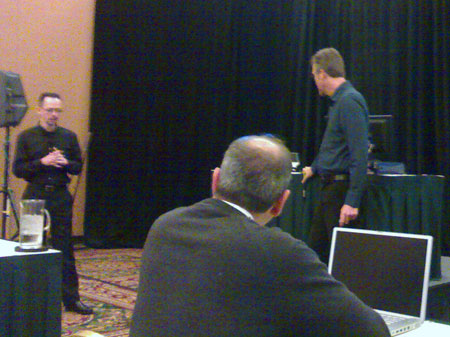I’m in my first session for ETech 2006 – watching Jeff Veen and Jesse James Garrett talking about Designing the next generation of Web Apps:

An insight that I’ve gained from the session so far – that there have been two kinds of people in the world – people who think of the web as a browsable information resource and those that have tended to view the web as analogous to a desktop application. Jesse made a point that really reminded me of something dumb I wrote about weblogs a while back – that the web is being framed in terms of things that people have known before and that we’re still determining what the web actually is. And what it’s gradually revealing itself to be is neither (information resource / application) and yet both. It’s something new which we have to craft for in a new way. Very much liking that – it’s like the distinction between document and application has collapsed and is now being rebuilt and reconfigured from the ground up. Very nice indeed. Lots of nice thoughts coming out of that…
4 replies on “Veen & JJG at ETech 2006…”
Oh my, just two states? They are missing a very important state, which is for use beyond the web. The current obsession with the web is for web-based applications, but most people don’t really want that, they want digital information and media to work into their already established personal digital information workflow.
People want information to drop into their calendars, address book, bookmarks, clipboard, SMS, MMS, map, file storage that syncs (what was Google thinking?), photo repository, etc. People have tools they rely on daily that work across their devices, locations, and contexts. The web needs to focus on the content objects for off-web use and reuse.
People do not go to the web to find the time and date of the party they are going to. They want to look in their calendar, which is synced with the calendar in their mobile. We need to start drawing the lines to real problems and start solving those.
with all due respect, thomas, i don’t feel that you understand what coates means when he uses the word “Web”…
you say “People do not go to the web to find the time and date of the party they are going to. They want to look in their calendar, which is synced with the calendar in their mobile”, and who could disagree with you? what you say is obvious and true. but what you imply is that one’s calendar somehow ISN’T part of “the Web”. and that one’s mobile isn’t part of “the Web”.
i propose that what you are implying simply isn’t true. the “Web”, as coates uses it, isn’t about the user experience one has in Internet Explorer; rather, the “Web” is a metaphor for networked nodes of interconnected information. and one’s calendar and mobile device certainly ARE part of that “Web”. if one’s phone and one’s calendar are going to be seamlessly sharing data/content objects, how’s that sharing going to be enabled if not by, uh, the “Web”?
your notion of “infocloud” is decently profound, but do you really think it’s NOT related, intimately, to coates’ notion of the “Web”?
Chris, I do understand Tom’s web use. My problem is not Tom’s focus but other focus on the web. The presentation just focussed on web use. Compared to the Ray Ozzie presentation, which gets to solving real problems for real people.
Not that the Adaptive Path information is not valuable for those that have not heard it, but it is not forward or current time focussed. It is where we were and the focus on just the web component is not helping the majority of people who need the information to sync with their devices on other platforms.
The web is a platform of information transience for much that is there. Most often than not the web is not where the information is best used or reused. The web is a place to find and aggregate information that will be used or reused elsewhere. The use context is not always on the web, and for many the use is rarely on the web.
thanks, thomas, sounds like we probably don’t disagree, then, but instead have a difference in emphasis. and a different definition of “web”.
i’m uncomfortable when i hear people refer to the Web as one among many “platforms”. guess i think that the PC is a platform, a mobile phone is a platform, an iPod is a platform, and a TV set is a platform.
but, to me, the “Web” isn’t a platform. it’s a metaphor for interconnected data.
if i’m not mistaken, you are saying that PC-and-browser-based access to/manipulation of one’s data isn’t usually the ideal context. clearly, you don’t want to login to your laptop just to see if your standby tickets are still available when you are standing outside the movie theatre; agreed.
however, if you access this info on your phone, you’d be using the “Web”, at least in my metaphorical sense.
so, we’ve got 2 differing meanings for “web”… confusing, but not contradictory. i’ll try to come up with a different label for my definition. maybe there already is one floating around out there?